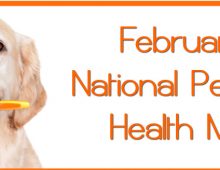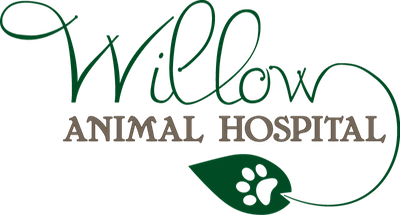Category Archives: Animal Care
Help! My Pet Has Bad Breath!!
February is National Dental Health month! Pets need dental care just as much as we do. Here are some common questions and answers about periodontal disease.
What are some signs of dental disease in my pet?
•Foul smelling breath, brown tartar accumulation on the teeth, food falling out of the mouth when chewing, and inability or difficulty eating hard food are some common signs. Some pets exhibit no signs at all.
What should I do if I think my pet has dental disease?
•Schedule an appointment to consult with your veterinarian. Often they will recommend a dental cleaning just like we get done at the dentist.
How do I prevent dental disease in my pet?
•Yearly or biannual dental cleanings are most effective at preventing and treating disease, but there are some at home products available to help decrease the frequency of cleanings. When you are looking for products to help prevent dental disease, look for the Veterinary Oral Health Council (VOHC) seal of approval. This ensures that veterinarians have studied the product and believe that it actually works. Products (in order of most effective to least effective) include: prescription dental diets, pet toothbrushes and toothpaste, dental chews, and dental sprays. These products are most effective when used on a daily basis. Dr. Sarah Myers, Willow Animal Hospital
(photo courtesy of: www.bmpah.com)
Baby, It's Cold Outside!
Its cold weather season! For outdoor pets, adopt the following rules to keep them safe during subzero temperatures:
•Provide a shelter to escape the cold that is clean, dry and insulated (garage, shed, kennel)
•Avoid abrupt temperature changes like bringing pets into a heated facility and then back out into the extreme cold as this can put them more at risk for certain infectious diseases
•Keep your pets dry with regular bedding changes, removing wet blankets or covers, and providing a shelter to avoid getting wet in the first place
•Use a heated water container and check it regularly to ensure there is plenty of liquid water available
•Increase feed by about 10-15% in order to help pets tolerate the cold stress
•Take caution with the products you use to help melt ice and snow as they can be irritating to pets’ feet or GI tract when ingested. Look for pet safe salts or avoid use when possible.
•With outdoor cats and wildlife in the area, make sure to tap on your hood before starting the car to make sure they are not cuddling up next to the heat of the engine
•Keep your pet away from lakes and ponds in the area that could have thin ice
Dr. Sarah Myers, Willow Animal Hospital
(photo courtesy of: theforumnewsgroup.com)
2016 Vaccination Clinics
Our vaccination clinics offer a closer-to-home option for keeping up on your dog or cat’s routine vaccinations. We visit Oulu, Port Wing, Cornucopia, Maple, Brule, Mason and Mellen annually (just in time for dog licensing). Stop by for annual heartworm and tick-borne diseases testing/prevention, internal parasite treatment/prevention, and discounted vaccinations for your faithful pets!
See our website for more information about dates, times and locations. (photo courtesy of: www.lakewood.org)
Allergies?
Do you think your pet has a food allergy? Food allergies can cause both allergic skin disease and gastro-intestinal problems. Symptoms of allergic skin disease include scratching or licking the skin which can result in poor coat quality, hair loss and skin infections. Gastrointestinal symptoms of food allergies in-clude vomiting and diarrhea. Diagnosis of a food allergy involves consultation with your veterinarian and a food allergy elimination diet trial. Dr. Sarah Myers, Willow Animal Hospital
(photo courtesy of: expertbeacon.com)
What is Lepto anyway?
Leptospirosis is a potentially fatal bacterial disease that can cause a very sudden onset of kidney and liver failure in dogs. It is transmitted through urine from infected mammals – often wildlife. Dogs that are at highest risk are those that drink water sources that could be contaminated with wildlife urine. Prevention of this disease is possible with a two shot initial series followed up by an annual vaccine. Leptospirosis is a zoonotic disease, meaning it can be spread from animals to people. Therefore, keeping your pets safe from the disease will help to prevent transmission to your family too. Dr. Sarah Myers, Willow Animal Hospital
(photo courtesy of: www.playbuzz.com)
Independence Day Tips
Happy 4th of July! As you enjoy the festivities remember to keep your pets’ safety in mind. The stressful noises of parades and fireworks can be a major source of stress for your pets. Make sure they are secured in a safe place or on a secure leash during parades and fireworks. The loud noises from the festivities can often scare pets enough that they run away and become lost. If your pets’ stress is severe schedule an appointment with your veterinarian to discuss medication options that may help to calm them. Dr. Sarah Myers, Willow Animal Hospital
(photo courtesy of: www.seesamsit.com)
Eh? What's that? Speak up!
Ear infections are one of the most common infections seen at a vet clinic. Clues that your pet might have an ear infection include head shaking and ear scratching with increased frequency. Sometimes just a bad odor or lots of debris in the ear is the main symptom. Ear infections can become severe the longer they are present causing hearing loss or head tilts from inner/middle ear infections. Prompt treatment is important so contact your veterinarian if you are concerned about an ear infection right away! Dr. Sarah Myers, Willow Animal Hospital
(photo courtesy of: prospectparkanimalclinic.com)
Kids & Pets
Did you know that pets can transmit some infections to people? These types of transmissible conditions are called zoonotic diseases. With good preventive care risk is extremely low. Intestinal parasites are one of the most common zoonotic diseases we see in pets. We recommend monthly preventive deworming products to prevent your pets from getting intestinal parasites. Preventing your pets from getting these infections is the first line of defense in preventing transmission to your family. Schedule your pet’s annual exam to learn more about which product is best for your pet! Dr. Sarah Myers, Willow Animal Hospital
(photo courtesy of: topicnow.info)
Attack of the ticks!
Tick season is coming!! Are you ready?? There are several common tick transmitted diseases in northern Wisconsin including Lyme, Anaplasmosis and Ehrlichiosis. These diseases can cause serious illness and even be deadly to our four legged friends. Using monthly tick prevention products like Vectra 3-D or Frontline along with daily tick checks are the best way to prevent transmission of these diseases in our pets. It can take several months after transmission before symptoms develop. Once symptoms do develop they often come on very quickly (less than 24 hours). If your pet displays lethargy, limping, or lack of appetite contact your veterinarian as these are common signs of tick transmitted diseases. Early treatment can help to prevent fatal complications so don’t delay in calling your veterinarian! Dr. Sarah Myers, Willow Animal Hospital (photo courtesy of: http://becuo.com)
Our Online Pharmacy is Here!
Willow Animal Hospital is proud to offer pet food, products, medications, even prescriptions online via its online pharmacy. Create an account and your orders will be delivered right to your door! Free shipping on orders over $49 or for AutoShip orders.
Have questions? Give us a call at 715-682-2470 and we’ll be happy to help.
















